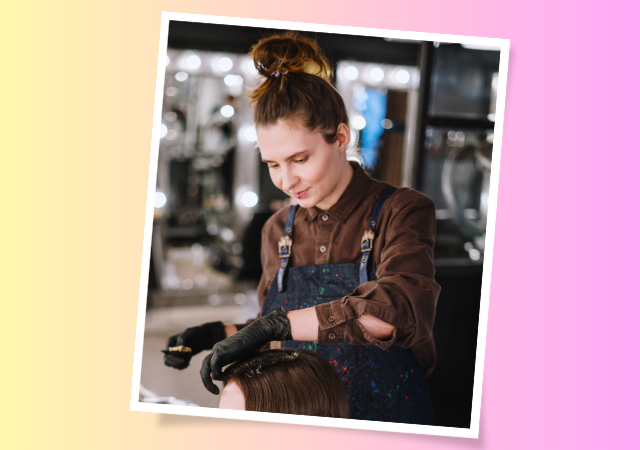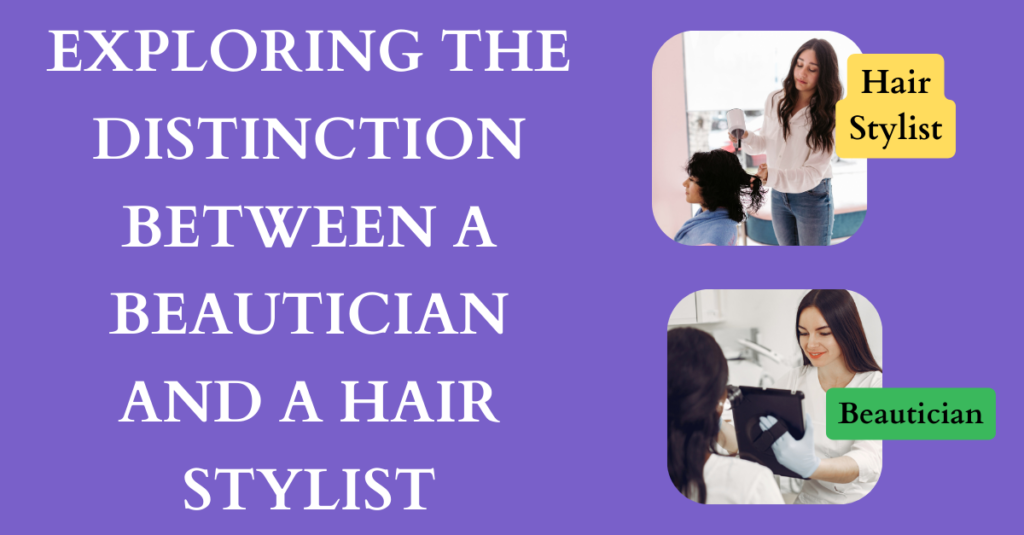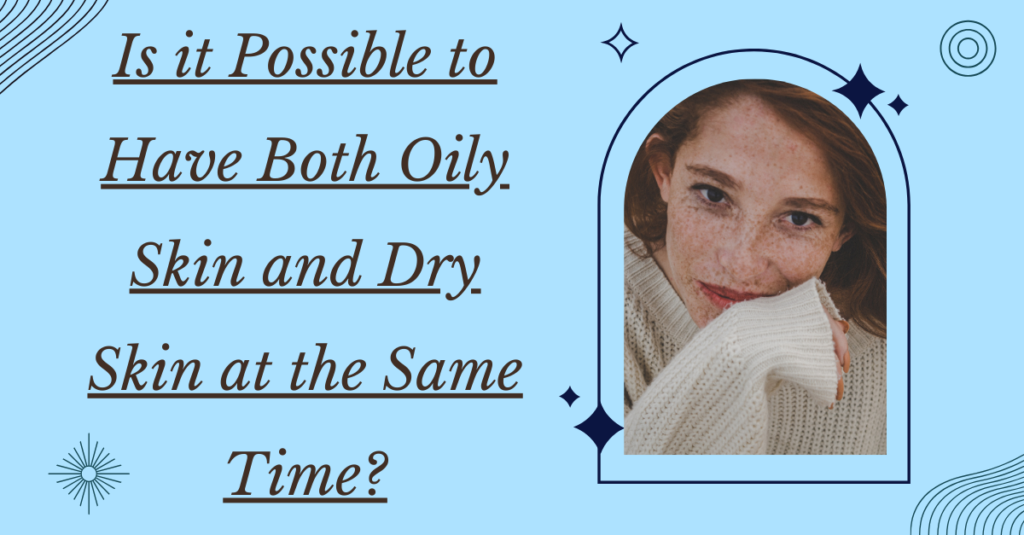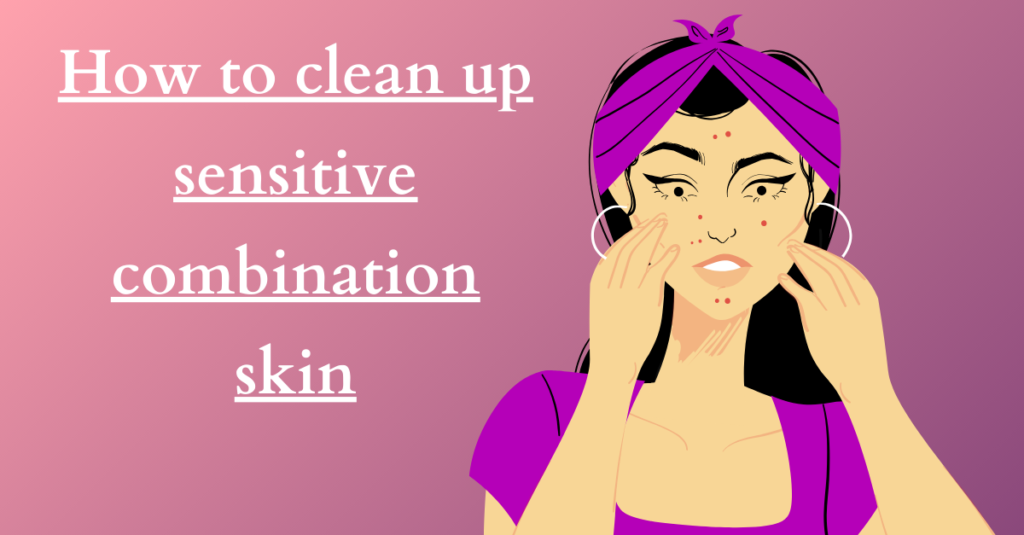Exploring the Distinction Between a Beautician and a Hair Stylist
Introduction
In the world of personal grooming and self-expression, there are numerous professionals dedicated to enhancing our appearance and self-confidence. Two key players in this realm are beauticians and hair stylists, individuals who possess distinct sets of skills and expertise. They play pivotal roles in helping us look and feel our best, but understanding the differences between these two professions is crucial when seeking the right services for your beauty needs.
This article embarks on a journey to explore the intriguing and often misunderstood distinction between beauticians and hair stylists. While they both contribute significantly to our beauty and wellness, each profession has its unique focus, services, and training requirements. By delving into the specifics of what beauticians and hair stylists do, the educational pathways they follow, and the services they provide, we aim to shed light on their individual roles within the beauty and grooming industry.
Join us as we unravel the secrets of these beauty professionals, allowing you to make informed decisions when it comes to your personal style and transformation.
The Beautician: Masters of Skin, Nails, and Makeup

Definition and Scope of Work
Beauticians, sometimes referred to as cosmetologists, are experts in enhancing and maintaining the beauty of the skin, nails, and makeup. Their primary focus is on the aesthetics of these areas, and they offer a wide range of services designed to help clients achieve a radiant and flawless look.
Services Offered by Beauticians
- Skin Care Treatments: Beauticians are skilled in a variety of facial treatments, such as facials, masks, and chemical peels. They analyze skin types, conditions, and concerns to recommend and perform treatments that rejuvenate and revitalize the skin.
- Nail Care and Manicures: Nail care is another vital aspect of beautician services. This includes manicures, pedicures, and nail enhancements such as acrylics and gels. Beauticians excel in nail artistry, enabling clients to express their style through their nails.
- Makeup Application and Cosmetics Expertise: Beauticians are makeup artists who are well-versed in the art of makeup application. They help clients achieve various looks, from everyday natural beauty to elaborate and creative styles. Their expertise extends to selecting the right cosmetics products and colors that complement a client’s features.
Education and Training Requirements for Beauticians
To become a beautician, individuals typically need to complete a state-approved cosmetology program, which covers a wide range of topics, including skincare, nail care, and makeup application. This program includes both classroom instruction and hands-on training, preparing students to pass a state licensing examination. Upon successful completion of the program and exam, beauticians receive their cosmetology license.
Regulatory and Certification Standards
The beauty industry is subject to regulations that vary by location, but generally, beauticians must adhere to state licensing requirements. This ensures that they maintain high standards of health and safety for their clients. Beauticians can also pursue additional certifications in specialized areas of skincare, nail care, or makeup application to further enhance their skills and marketability.
The Hair Stylist: Mastering the Art of Hair

Definition and Scope of Work
Hair stylists, on the other hand, specialize in all aspects of hair care, styling, and treatments. Their primary focus is on hair, and they are experts in the art of creating and maintaining a wide range of hairstyles.
Services Offered by Hair Stylists
- Haircuts and Styling: Hair stylists are skilled in cutting, shaping, and styling hair. They can create classic cuts or the latest trendy styles, ensuring that clients leave the salon with a look that suits their preferences and lifestyle.
- Hair Coloring and Highlighting: Hair stylists are proficient in the art of coloring hair. They can change a client’s hair color entirely or add highlights and lowlights to achieve a desired effect. This involves selecting the right products and techniques to create stunning results.
- Hair Extensions and Treatments: Hair stylists offer services like hair extensions, hair straightening, and various hair treatments. Whether a client wants to add volume, length, or manage their hair’s texture, hair stylists have the skills to achieve the desired outcome.
Education and Training Requirements for Hair Stylists
Becoming a hair stylist typically requires completing a state-approved cosmetology program, much like beauticians. This comprehensive training includes both theory and practical lessons related to hair cutting, styling, coloring, and more. After completing their program, individuals must pass a state licensing exam to practice professionally.
Regulatory and Certification Standards
Hair stylists must obtain and maintain a state cosmetology license. This ensures they adhere to the health and safety standards of the industry. Some hair stylists may also pursue advanced certifications in specific areas such as color correction, hair extensions, or barbering.
Overlapping Skills and Responsibilities

While beauticians and hair stylists have their distinct specialties, there is a significant overlap in the services they provide. In many salons and spas, these professionals work together to offer clients a comprehensive beauty experience. Some of the services where their skills intersect include:
- Hair Removal: Both beauticians and hair stylists can offer hair removal services, such as waxing or threading, to help clients achieve smooth and hair-free skin.
- Makeup for Special Occasions: While beauticians are known for their makeup expertise, hair stylists may also have makeup skills and can assist clients in preparing for special events, weddings, or photoshoots.
- Consultations: Both professionals provide consultations to understand their clients’ preferences, style, and desired outcomes, ensuring that the services they offer align with the client’s vision.
- Client Education: Both beauticians and hair stylists educate their clients on proper at-home care and maintenance to preserve the results of their services.
Key Differences
Despite these overlapping services, there are several key differences between beauticians and hair stylists:
Focus on Primary Expertise: The most significant distinction is that beauticians primarily focus on skincare, nail care, and makeup, while hair stylists specialize in hair care and styling. Their core expertise lies in these respective areas, making them the go-to professionals for specific beauty needs.
Educational Pathways and Certifications: While both professions require completion of a state-approved cosmetology program and licensing, their training programs emphasize different skill sets. Beauticians learn skincare and makeup, while hair stylists focus on hair-related services. Consequently, their training programs may include distinct coursework and practical experiences tailored to their respective areas of expertise.
Specializations Within Each Field: Within the realms of beautician and hair stylist professions, there are numerous specializations and niches. For beauticians, specializations can include becoming a skincare specialist, a nail technician, or a makeup artist who excels in theatrical or special effects makeup. Hair stylists may specialize in cutting and styling, hair coloring, hair extensions, or working as a barber. These specializations allow professionals to hone their skills and offer specific services that cater to their clients’ unique needs.
Understanding these key differences is essential when seeking beauty services, as it helps clients make informed decisions about which professional to choose based on their specific needs and preferences.
Career Prospects and Job Opportunities

Both beauticians and hair stylists have a wide range of job opportunities and career prospects in the beauty and grooming industry. These professionals can work in various settings, including:
Job Settings for Beauticians:
- Salons and Spas: Many beauticians find employment in beauty salons and spas where they provide skincare, nail care, and makeup services to a diverse clientele.
- Retail: Some beauticians work in cosmetics and skincare retail, helping customers select the right products and providing makeup demonstrations.
- Freelance and Mobile Services: Beauticians can establish their independent businesses, offering on-location services for events or personal clients.
Job Settings for Hair Stylists:
- Salons and Barbershops: Hair stylists often work in traditional salons and barbershops, offering a wide range of hair services to clients.
- High-End Salons: Some hair stylists choose to work in upscale salons that cater to a more exclusive clientele, allowing for higher earning potential.
- Specialized Salons: Specialized salons may focus on services such as hair extensions, color correction, or curly hair expertise, creating niche job opportunities for hair stylists.
- Freelance and Editorial Work: Hair stylists may also engage in freelance work for fashion shows, editorial shoots, or film and television productions.
Career Growth and Advancement Opportunities in Each Field:
Both beauticians and hair stylists have avenues for career advancement and professional growth. This can include:
- Senior Stylist or Beautician: Senior positions often involve greater responsibilities and higher salaries.
- Salon or Spa Management: Many professionals choose to become salon or spa managers, overseeing daily operations and staff.
- Educators and Trainers: Experienced beauticians and hair stylists may transition into roles as educators, teaching the next generation of professionals.
- Entrepreneurship: Some individuals opt to start their own beauty salons or spas, allowing for increased independence and financial rewards.
- Specialized Certifications: Ongoing education and specialized certifications can lead to expertise in a particular area, enhancing career opportunities and income potential.
Conclusion
In the fascinating world of personal grooming and aesthetics, the roles of beauticians and hair stylists are instrumental in helping individuals look and feel their best. While their services often intersect, understanding the distinctive focus, training, and specializations of each profession is essential for making informed decisions about your beauty needs. Whether you’re seeking a rejuvenating facial, a trendy haircut, or a glamorous makeover, knowing whether to turn to a beautician or a hair stylist will ensure that your beauty aspirations are met with expertise and precision.
The beauty and grooming industry thrives on the diversity and specialization of these professionals, creating a dynamic landscape of opportunity for those who choose to pursue careers in these fields. So, the next time you visit your favorite salon or spa, take a moment to appreciate the unique skills and expertise that beauticians and hair stylists bring to the table, ensuring that you leave looking and feeling your absolute best.

My name is Rohit Vagh and I’m a content writer specializing in fashion and lifestyle. I have three years of experience in this field and have written various articles. My writing style is creative and engaging, and I strive to create content that resonates with my readers. I have a deep passion for fashion and am constantly researching the latest trends and styles to make sure my readers are up to date. I’m excited to continue my career in blogging, and I’m always looking for new opportunities in the fashion and lifestyle space.





